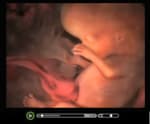Pro-Choice Abortion
Pro-choice Abortion - It Wasn't a Choice
Pro-choice abortion is the belief that women have the right to choose to abort a baby from their body. The "pro-choice" view is that a baby does not have human rights within the mother's womb. The people of the United States never voted on or supported this pro-choice position. Actually, it was the U.S. Supreme Court that "legalized" abortion as a result of Roe vs. Wade on January 22, 1973.
Pro-choice Abortion - The Procedural Choices (no gory details)
Pro-choice abortion allows women to choose how to abort an unwanted child. Typically, the abortion method is determined by the age of the fetus. During the first trimester of growth, a woman may elect to use the "morning after pill" (RU-486) or have a Suction Abortion. At the end of the third month, the abortion is usually performed by Dilation and Curettage (D&C) or, after thirteen weeks, a Dilation and Extraction (D&E). After sixteen weeks of fetal growth, a woman can choose to experience a Partial Birth Abortion or have Saline Amniocentesis. Regardless of the moral and religious implications, every woman should investigate how each procedure is done, what side effects are normal or abnormal, and what complications may arise due to having an abortion.
Pro-choice Abortion - Consider the Health Risks of Abortion
Pro-choice abortion is supported by Planned Parenthood, which is being sued for failure to provide information to patients of risks associated with having an abortion. Planned Parenthood is not being sued for cash. Instead, the organization is being asked to inform patients of the link between breast cancer and abortion. Reports show termination of pregnancy interrupts cellular changes that occur in the breast during pregnancy. According to recent figures, 28 out of 37 studies link abortion to a 30% to 800% increased risk of breast cancer. Legal precedence linking abortion to breast cancer was first made in Australia on December 28, 2001.
Women contemplating this procedure should consider another risk of abortion: Pelvic Inflammatory Disease (PID). PID is a well-known infection occurring in 5.2% of first trimester abortions and 18.5% of mid-trimester abortions at John Hopkins University. These percentages likely double at some unaffiliated clinic facilities throughout the United States. PID often renders its victims infertile, even with prompt treatment. (M. Spence, "PID Detection and Treatment," Sexually Transmitted Disease Bulletin JHU, Vol. 3, No. 1, Feb. 83.)
In addition to the foregoing risks, 1% of women having an abortion will need a blood transfusion, of which 10% will contract Viral Hepatitis. Approximately 2% of these women will die. With 1,600,000 estimated abortions annually in the U.S., that means 32 women a year will die from transfusions needed after having an abortion. (R. Voelker, "Hepatitis B: Planned Standard," AM MED News, Oct. 13, 1989, pg. 2.)
Pro-choice Abortion - Is There Really A Choice?
Pro-choice abortion - The facts are clear; abortion puts you at risk, medically and morally. We just reviewed the medical abortion risks; now what about the moral/ethical risks inherent in terminating a life? Of course, the argument in favor of the "pro-choice" position is that the fetus is not a human life; it's merely a fertilized egg between a man and a woman. Here's the basic argument for why that "justification" breaks down at any point in the human gestation process. First, according to biological definition, we know that the fetus growing in the womb is "alive" from the moment of conception (cell growth/development occurs immediately). Second, we know that the nature of the life in that womb is undeniably "human" (the miracle of DNA). Third, by definition, an abortion terminates the fetus within the womb, which is alive and human by nature. Therefore, abortion is the act of terminating a human life. Legal or not, medically safe or not, this is not a choice we can make.
What is your response?





